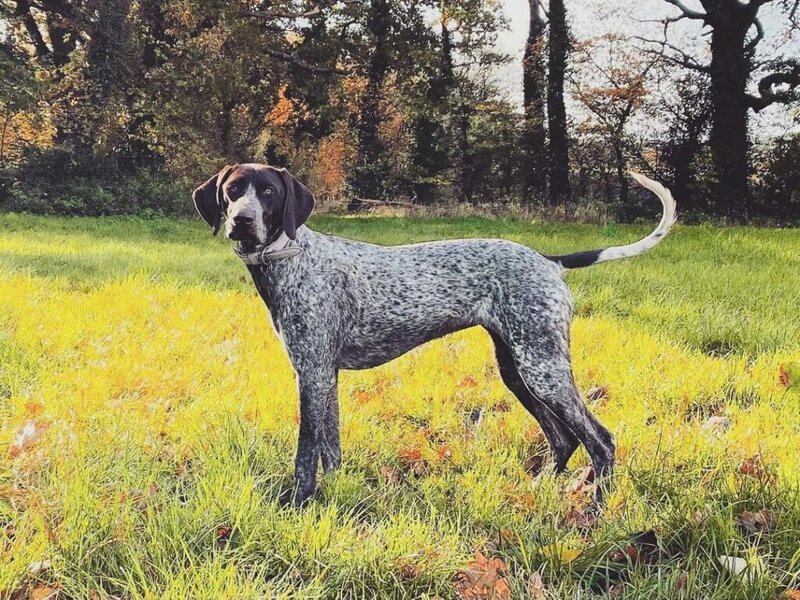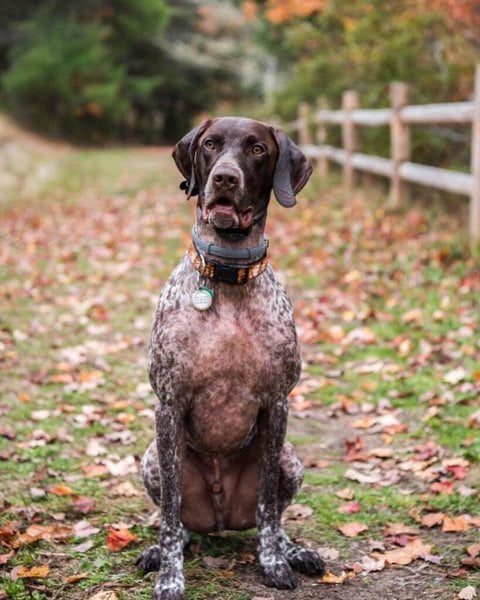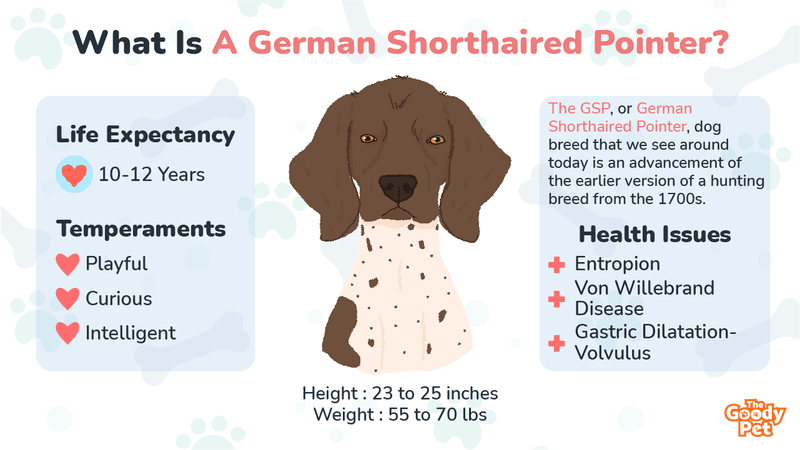German Shorthaired Pointers are exceptional hunting dogs who also enjoy an occasional cuddle. This impressive breed was by no means bred by accident.
The GSP, or German Shorthaired Pointer, dog breed that we see around today is an advancement of the earlier version of a hunting breed from the 1700s. Prinz Albrecht zu Solms Braunfels was an incredibly influential advocate for the development of a versatile hunting dog. The prince and his associates succeeded in breeding an athletic, intelligent, and natural hunting dog.
These GSPs were later recognized by the American Kennel Club as a legitimate breed only in the 1900s. Although they were bred to be exceptional hunters, GSPs are naturally drawn to people, and they can be quite the curious bunch. We will be discussing things that you ought to know about GSPs, including their health, care, and temperament. However, let’s first understand whether GSPs are good pets or not.
Are German Shorthaired Pointers Good Pets?
German Shorthaired Pointers are good family dogs who can interact well with children and other dogs. They are medium-sized dogs, so they are not too large to roam around the house. The GSP appearance is a feature that the world has fallen in love with.
Physical Appearance
German Shorthaired Pointers have excellent posture and athletic physiques. They also have floppy ears, along with large brown noses and chiseled heads. German Shorthaired Pointers have mesmerizing almond-shaped eyes.
The most notable physical feature is undoubtedly their unique and dense fur coats. German Shorthaired Pointers have short and sleek liver or white and liver fur coats that often manifest in interesting patterns.
Size
A male German Shorthaired Pointer can reach a height of 23 to 25 inches and weigh between 55 to 70 lbs. A female GSP can reach a height of 21 to 23 inches and weigh between 45 to 60 lbs.

How Long Do German Shorthaired Pointers Live?
German Shorthaired Pointers are generally healthy and can be expected to live for 10 to 12 years.
GSPs are prone to potential health issues which include Von Willebrand disease, gastric dilatation-volvulus, and entropion. To help your GSP live a longer and healthier life, you should take them for regular screenings.
Von Willebrand Disease
Von Willebrand disease is a blood disorder. This disease disrupts the clotting process by reducing the von Willebrand factor in your GSP’s blood.
Symptoms of Von Willebrand disease include bleeding gums, prolonged bleeding after surgery, frequent nose bleeds, and long periods of bleeding during heat cycles. This disease can be diagnosed between the ages of 3 to 5 years.
This disease cannot be cured but it can be managed. Management of Von Willebrand disease includes suturing injuries, avoiding some medication, and blood transfusions from dogs who do not have this disease.
Gastric Dilatation-Volvulus
Gastric dilatation-volvulus, or GDV, is a condition that generally affects deep-chested dog breeds, like the GSP, and it can be life-threatening.
Your GSP’s susceptibility to this condition is higher when they drink too much water after meals, eat too quickly, undergo strenuous exercise after meals, and when you feed them one large meal daily.
GDV occurs when the stomach is bloated and twists. Your GSP would be unable to spew up or belch, to relieve themselves from the stomach pressure that accompanies boating.
Your GSP’s regular blood flow will be impeded, resulting in their blood pressure dropping and your dog will enter a state of shock. If your GSP does not receive the immediate medical care they could die.
Symptoms of bloating are excess drooling, distended abdomen, and retching. Other symptoms include your GSP being depressed, weak, and lethargic with a fast heart rate.
If you suspect that your dog may be affected by GDV, you should get them to the veterinarian as soon as you can. Early intervention can save your GSP’s life.

Entropion
Entropion is a condition that causes your dog’s eyelid to roll inward. This causes your dog’s eyelashes to rub on your dog’s cornea which leads to irritation and can be quite painful.
This defect can be observed as early as when your GSP is six months old. Symptoms of entropion are frequent and vigorous rubbing of the eye. This defect can be corrected by undergoing surgery.
How To Take Care Of Your German Shorthaired Pointer?
There are three key aspects to consider when providing the right care for your German Shorthaired Pointer, namely setting up an exercise routine, giving a high-quality diet, and protecting its dental health.
Dietary Needs
You should feed your GSP about 2 to 3 cups of high-quality dog food daily. These measurements should be divided into two meals. If your GSP puppy is younger than 6 months, you have to feed them more than twice a day.
For some high-quality dog food that will replenish your GSP’s energy and maintain their overall health, we suggest Pet Plate meals. These meals are freshly prepared and full of good nutrients for your dog, and of course, they are also absolutely delicious.
The amount of food that you feed your GSP is largely dependent on size, metabolism, physical activity level, and age. Since German Shorthaired Pointers are prone to gastric dilatation-volvulus, they should not be fed directly after undergoing strenuous physical activity.
You should also not feed your German Shorthaired Pointer and then allow them to undergo vigorous physical activity directly after eating because it increases the likelihood of your pooch experiencing gastric dilatation-volvulus. Your GSP should rest for at least an hour.
Exercise Routine
GSPs require a minimum of 60 minutes of exercise daily. This hour can be divided into two 30-minute sessions of brisk walking, long walks, running, and playing in the yard or park. However, GSPs are better off with more exercise rather than less.
GSPs were bred to serve as hunting dogs, so they are inherently active. GSPs require enough space to play. This breed is best suited to individuals who have large homes and yards.
If you are an apartment dweller, then GSP might not be the correct dog breed for you. However, if you still lead an active life with constant trips to the park, regular jogs, and hikes then you could keep up with the GSP’s physical needs.
German Shorthaired Pointers tend to become anxious when they are not given an adequate opportunity to release their pent-up energy. To relieve themselves of their pent-up energy, GSPs would often become destructive.
Dental Health
Since German Shorthaired Pointers are highly active dogs and often require wet food, they may require mouth and teeth cleaning regularly. Failing to do so may result in dental issues that can be of great discomfort to your pooch.
We recommend investing in dental water additives. These additives can help to maintain oral hygiene and to protect your GSP from periodontal diseases.
Simply add a few drops of additives into the daily drinking water for your pooch and you are all set for the day!
Are German Shorthaired Pointers Easy To Train? Temperaments Of German Shorthaired Pointers
German Shorthaired Pointers are not easy to train because they can be quite stubborn and require high training stimulation when it comes to training.
Both reasons are likely due to their high intelligence trait, given that GSPs are ranked high up on Stanley Coren’s ranked list of dog intelligence.
GSP puppies have to be trained from an early age. Your puppy needs to be introduced to different people and pets from a young age so that you can establish early socialization.
Between the age of 6 months to 3 years old, these GSP puppies are generally a handful to deal with and you would find it frustrating to train them. However, with enough patience and treats, you should succeed.
Alternatively, you can consider bringing your GSP puppy down for puppy training classes. These classes are run by professionals who know how to go about training GSP puppies. GSPs are an intelligent breed so they tend to adjust to their training with ease.
Curious By Nature
GSPs are hunting dogs by nature so they tend to have a keen sense and desire for adventure. Their curious nature makes them challenging to handle between the ages of 6 months and 3 years.
Even though having a routine is always encouraged, you should try to switch things up, now and then, in terms of your GSP’s physical activities. Try taking your pooch for hikes in different hills and mountains, this will stimulate and satisfy their curiosity.
Playful And High-Spirited
GSPs have an endless reserve of energy and they love to burn as much of it as possible. They enjoy playing fetch with their owners or engaging in anything game-related. They appreciate being able to burn some energy while having fun.
GSPs will enjoy a family trip to the park. Since children tend to also have an endless reserve of energy, GSPs are the ideal playmates for children but only if they are adequately trained and were raised with children.
Do German Shorthaired Pointers Shed A Lot? Grooming Tips For German Shorthaired Pointers
GSPs do not shed too heavily but they do experience some shedding. GSPs mostly shed during spring and fall. However, in a country with a warmer climate, GSPs shed throughout the year.
Brushing
You should brush your GSP’s fur coat at least once a week. You should use a firm bristle brush to do the brushing. Since GSPs have short but dense fur coats, we suggest using the FURminator Undercoat Tool to remove lower layers of loose fur.
Bathing
You should only bathe your GSP when they are visibly dirty. Generally, you should bathe your pooch at least twice a year. To nourish their fur coat, you should use a high-quality shampoo and conditioner such as the Pro Pet Works All Natural 5 In 1 Oatmeal Shampoo.
We recommend cleaning the ears of your GSP at least once a month. GSPs’ generally have healthy teeth and you can maintain the health of their teeth by brushing them, with dog toothpaste, at least twice a week.
Related Questions
How Much Does A GSP Puppy Cost? You can expect to pay between $800 to $1,000 for a regular GSP puppy. However, show quality GSP puppies are more expensive, they cost between $3,000 to $4,000.
Are German Shorthaired Pointers Good Swimmers? German Shorthaired Pointers are exceptional swimmers. Interestingly, GSPs have webbed feet and sleek, muscular physiques such that they can maneuver easily underwater. However, they tend to get cold quite easily as a result of their short fur.
Do German Shorthaired Pointers Get Along With Cats? By nature, German Shorthaired Pointers do not get along with cats or other pets due to a high prey drive. However, with proper training and early socialization, GSPs can get along with cats.





